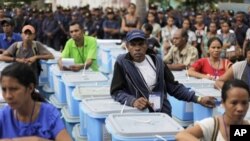Noisy and colorful political campaigns are filling the streets of the East Timorese capital Dili, as the country gears up for Saturday’s presidential election. Racked by political violence in 2006, this year’s elections will prove an important test of political stability for a nation rich in oil wealth, but suffering from high rates of unemployment and poverty.
Candidates
Trucks filled with chanting youths draped in the flags of political parties are everywhere in the East Timor capital.
The election is shaping up to be a three-way race between the incumbent, Jose Ramos Horta, Francisco ‘Lu Olo’ Guterres from the Fretilin Party, and former military chief Taur Matan Ruak.
Apart from an arson attack against an election office last month, the campaign season has been largely peaceful.
If the elections run smoothly, the contingent of U.N. and Australian troops are scheduled to pull out of East Timor by the end of the year.
Gangs
But there are still concerns about the country’s notorious martial arts groups.
Cillian Nolan is with the International Crisis Group and says the gangs still operate with impunity.
“Sometimes the police are unwilling to fully investigate crimes against those in other members of martial groups, which the police themselves may have been involved in," said Nolan. "I think there is still a lot to be done in terms of increasing independence and impartiality of the police to ensure these crimes are prosecuted.”
About 20,000 East Timorese are members of martial arts groups, which evolved from years of fighting against Indonesian security forces during the 24-year occupation.
In 2006, gang warfare in the country resulted in the destruction of up to 6,000 homes and the displacement of more than 140,000 people.
“They created 150,000 refugees, people’s houses burned and they had nowhere to go, nasty, and the bad thing is nobody ever got to the bottom of it," said Dr. Daniel Murphy, who heads a free medical clinic in Dili, where many victims fled to at the time. "Nobody knew who provoked who and who did what," he continued. "People are now running for president and everyone seems to have forgotten about that, but it is not that old, people still think about what happened back then.”
Security
After isolated attacks continued last year, the government has banned martial arts groups for operating for one year.
Nelson Belo, the head of a local NGO called Fundahasmein, which focuses on security and defense, admits the country has been relatively stable for the past few years, but says high unemployment and poor education encourage marginalized youth to join martial arts groups or MAG.
“The other problems, what I call time bombs," he said. "It is not about MAG itself but also about unemployment. For now there is the government ban, but when the suspension for one year is end, when they reactivate, they are going to be involved in new problems again. So it will be again and again.”
Poverty
East Timor is a tiny nation with a population of 1.1 million and is one of the world’s newest and poorest countries
Nearly 50 percent of the population lives below the poverty line, and most Timorese live on subsistence framing. But the country also has huge oil and gas reserves.
A recent International Crisis Group report described East Timor as ''an impoverished country with a very large bank account.''
The money carries a crucial test for East Timor’s government as it distributes that wealth to address the huge development challenges ahead.
But analyst Ed Rees says he is confident the upcoming presidential elections will go without a hitch this year, much like they did in 2002 and 2007. He says that is because the true political struggle over East Timor’s riches will be waged among legislators.
“The presidency is positioned with limited authority and as a result does not have the power to control the prize and the big prize is government," said Rees. "Whoever gets into government later on this year will control an oil fund coming on $10-billion and a monthly income of $125 to $140 million. That is the prize.”
The March 17 presidential election is the third since the nation was officially recognized as independent in 2002.
Saturday’s election will lead to a second round in April if no candidate wins a clear majority.




